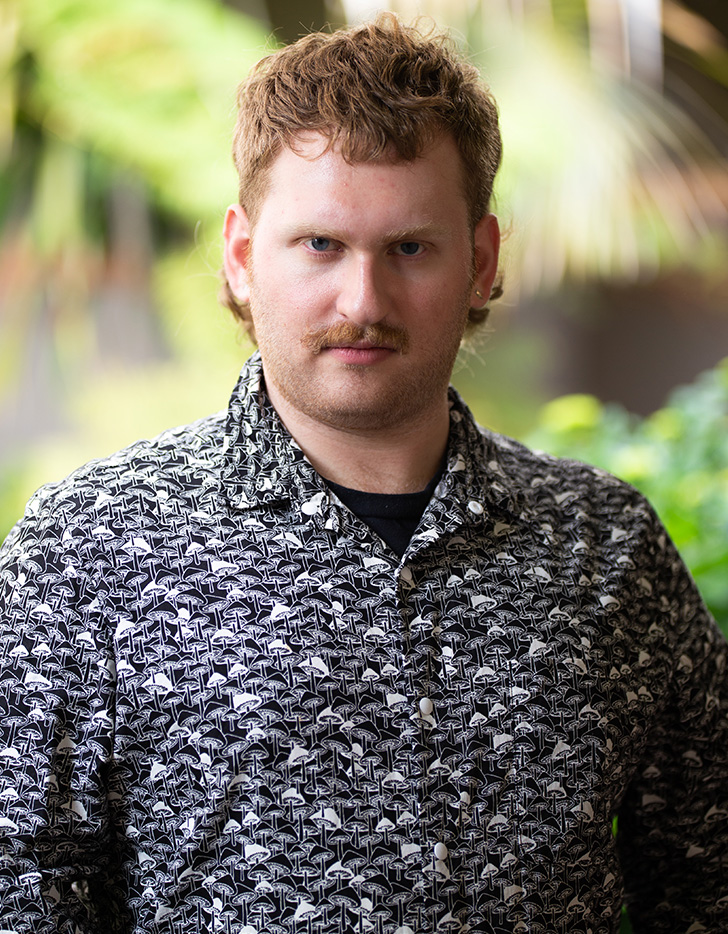
Sam Rosen (he/him)
PhD Student, Biomolecular Science and Engineering
Sam Rosen is a third-year biomolecular science and engineering (BMSE) student. Rosen, who is gay, earned his bachelor’s degree in physics and minored in computer science at Boston University. Advised by assistant professor Max Wilson, Rosen focuses his research on signal transduction heterogeneity among clonal stem cell populations. Signal transduction is the process by which a chemical or physical signal is transmitted through a cell as a series of molecular events. In those populations, all stem cells share an identical genome and are in the same physiochemical environment; however, they display heterogeneous, or irregular, signal transduction intensities. Rosen is working to better understand the role that signal transduction heterogeneity plays in stem cell fate decisions, or how stem cells differentiate and gain specified functions. He uses that knowledge to develop better regenerative medicine techniques and therapies to heal tissues and organs and restore function lost due to aging, disease, damage, or defects. After completing his PhD, Rosen plans to go into industry, either starting his own biotech company to continue his research or join an artificial-intelligence company.
COE: What does Pride Month mean to you as a member of the LGBTQIA+ community, and does it feel more important to observe and recognize it given all of the anti-LGBTQIA+ legislation being introduced across the nation?
SR: Pride is a celebration of community and queerness. It is a time where we can all come together and celebrate our identities and find a sense of belonging. This year, we have seen an endless slew of anti-queer bills being passed, with many of them targeting the trans community. As we are currently seeing in Florida, existing as a trans person is becoming more and more impossible by the day. This assault on our community has harmed us, but it has not weakened us as we will continue to stand strong as one united queer community. Pride is a celebration of community, and as long as we band together as queerfolk, we can rise up against hate and create a queer-friendly world. This year for Pride, instead of supporting corporations selling rainbow-washed goods, use your time and resources to support queerfolk. Pay attention to what bills are being passed, donate to LGBTQ+ support groups, advocate for queer liberation and support our community. We’re stronger together, and we invite you to help support and uplift us. Thank you!
COE: Why did you agree to share your story and participate in this project that celebrates Pride Month within the COE?
SR: Queerfolk in research positions have been historically underrepresented. Growing up, I didn’t know any queer folk in STEM. None of my science professors have been queer, in either graduate or undergraduate, and I can count on two hands the number of queerfolk I’ve met studying science . It feels isolating at times being one of the only queerfolk in your program, and that feeling used to make me doubt if I had a place studying biophysics. I thought that maybe I was just too queer for STEM. As I’ve become more confident in my queer and scientific identity, I’ve begun to recognize the importance of having a queer community in the sciences. By participating in this project, I hope to inspire future generations of queer folk to pursue the sciences and higher education by showing them that there is a queer community waiting for them in the sciences.
COE: What do you want people to learn or gain from reading the profiles on this page?
SR: I want people to realize the importance of having a queer community. Having more queerfolk in the sciences makes us all feel less alone and lets us know that there’s a place for us in (or within) STEM. Having non-queerfolk understand why Pride is important beyond the glitz and glamor of parades and brunches helps to inspire them to advocate for queer liberation alongside our community.
COE: How welcoming and inclusive have you found UCSB, the College of Engineering, and your department communities to be as a member of the LGBTQIA+ community?
SR: I mean, no one is openly homophobic. Again, there really aren’t a ton of queerfolk in my department, and I am the only queer person in my lab. I have found a pretty good group of queers here at UCSB, but for the most part, the queer community is very fractured. I don’t get a sense of unity at all, and it is hard to meet other queerfolk like myself.
COE: What could the college or university do to improve the environment?
SR: A great first step would be having a Queer in STEM meet-up once a month. That way I could meet other STEM queers!
